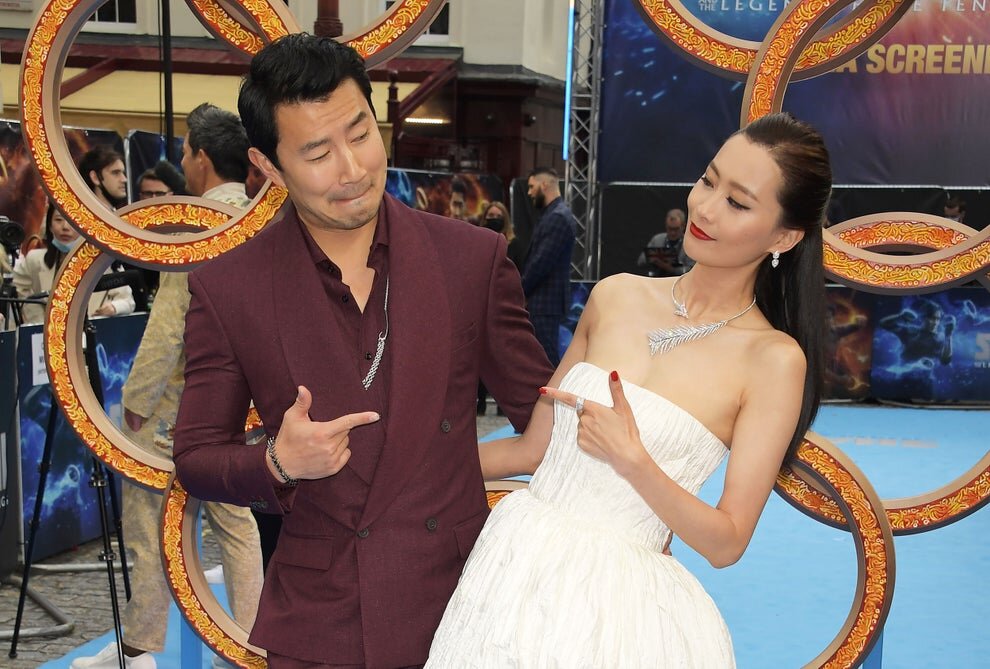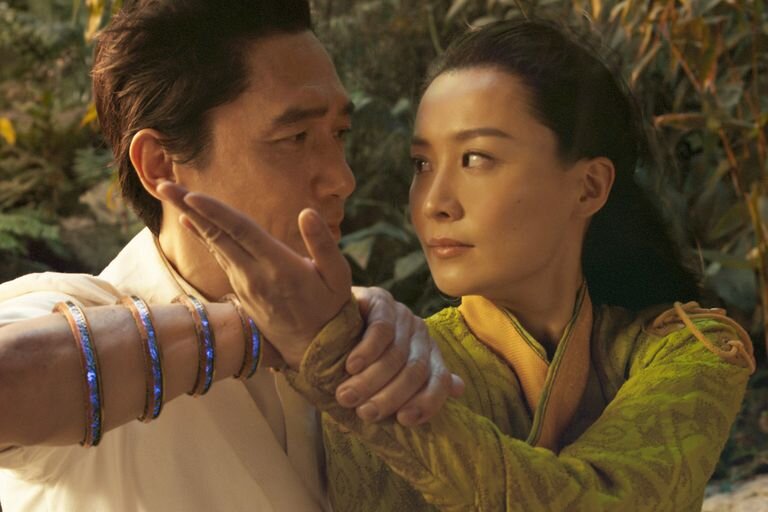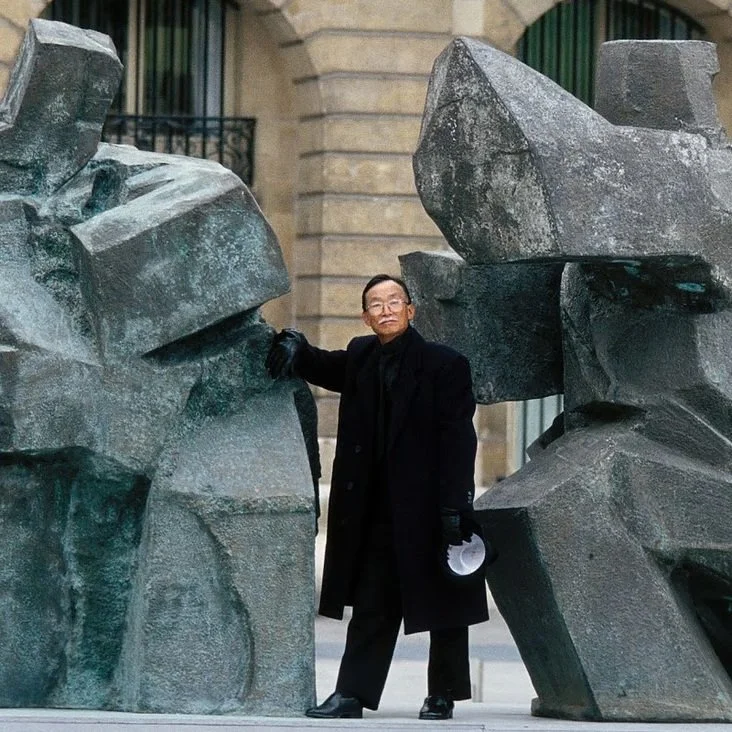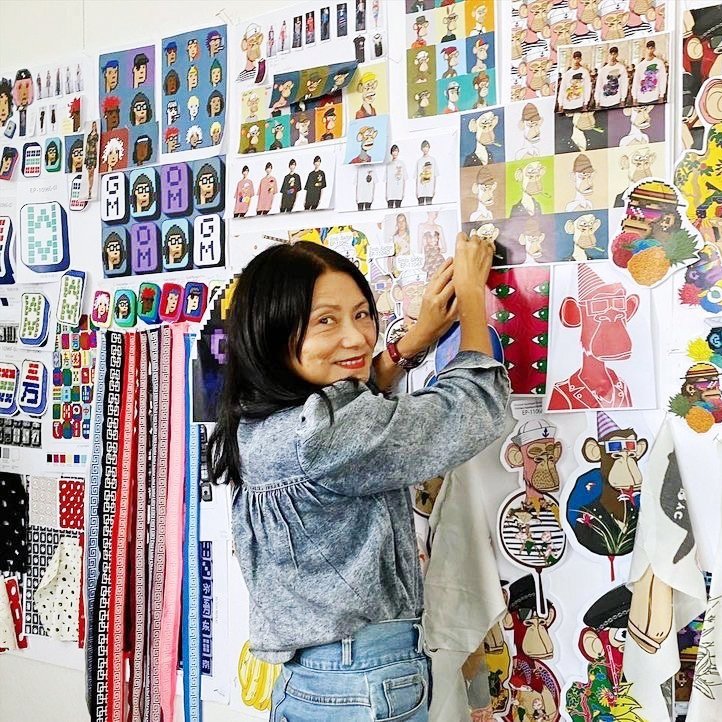Part 3 of Marvel's Shang-Chi: 陳法拉 Fala Chen's Courage, Performance, and Dazzling Transformation
Written by Deborah Lau-Yu
Images: Marvel Studios, Getty
fala chen with simu liu at UK shang-chi premiere on august 26, 2021 | IMAGE SOURCE: GETTY / DAVID M BENETT
fala chen at US shang-chi premiere on august 17, 2021 | IMAGE SOURCE: GETTY
sponsored by piaget.
If you are a die-hard fan of TVB and all the cultural production that was exported from Hong Kong, a mecca of entertainment, television productions and film, you may recall the very first impressionable moment of Fala Chen on stage. It was at the 2005 Miss Chinese International Pageant, where Fala represented NYC, after winning Miss Chinese New York prior. The hosts asked her a question: why is the concept of being fired from one’s job called “chow yau yue” or “fried squid” in local Cantonese vernacular? With a native tongue of Mandarin, Fala captured the heart of audiences like myself, when she answered quite simply along the lines of what I can remember vaguely as her answer: because when you are fired, you feel low and sad, and shrivel up like cooked squid. She used her body language and hand motions to indicate the curled up position and it was a witty, candid and naturally coherent answer that stood out amongst the other more rehearsed or forced responses on stage that evening. She was crowned as the runner-up in the competition, and was swiftly launched into her career in entertainment. In her first decade, every new and exciting drama series that she starred in was memorable, whether it was in her role as supporting cast or the lead: Catch Me Now 原來愛上賊 (as the wife of Joe Ma 馬德鐘), Heart of Greed 溏心風暴 (as an innocent and friendly young daughter of Louise Lee 李司棋), Moonlight Resonance 溏心風暴之家好月圓 (a memorable role as a deaf and mute sibling of the leads Raymond Lam 林峯 and Moses Chan 陳豪), Steps 舞動全城 (an outstanding role that showcased her dancing), Lives of Omission 潛行狙擊 (she co-starred as a police detective with Michael Tse 謝天華), No Regrets 巾幗梟雄之義海豪情 (as the younger sister of Wayne Lai 黎耀祥 in a war-time setting), A Journey Called Life 金石良緣 (playing the younger sister of Steven Ma 馬浚偉), Will Power 法外風雲 (as a lawyer opposite Moses Chan 陳豪 and Vincent Wong 王浩信) and Triumph in the Skies II 衝上雲霄II (with Julian Cheung 張智霖 and Francis Ng 吳鎮宇).
“Fala brings a different texture to the film and to the Marvel Universe — she is elegant, beautiful, mysterious and strong. In the rather graceful fight scene she presents with Tony Leung, she embodies the Chinese cultural phrase from martial arts, 以柔制剛, which means to use softness to control rigidity or hardness”
Despite her success and reasonably successful deliveries of all the roles at TVB, where she was able to be convincing as an innocent young daughter or a jealous half-villain, she knew more than audiences that something was missing inside. She was in-demand as a starlette, and could have coasted onto more roles and lucrative opportunities, which for for many young dream chasers and smaller celebrities would be their end-goal. But, she shared with media then and even more openly now, that she always felt like she was was pretending. In her work with TVB, which is known to be gruelling and fast-paced, often times she wasn’t able to develop her characters fully in an environment that was focussed on churning out results, and (arguably with reason as a company that has to keep pace with a fast-moving economy and business expectations) not so much about nourishing the art and pedagogy of performance. Acting alongside seasoned actors like the ones listed above, audiences witnessed her growth, and acknowledged her physical beauty, but there was definitely a missing depth of field that she yearned to uncover. So at the height of her then stardom, she decided to stop.
Fala made a huge and courageous move to step back from Hong Kong, and enrolled in the coveted Juilliard School for a Masters in Fine Arts, Performing Arts. As someone who followed her story, I recall praising her to relatives in Hong Kong and to friends who watched TVB here in Toronto — she was already a counter-culture role model in my eyes. For four years, she studied her craft, and devoted her life to her passion for acting, and mastering her performance.
In 2016, when visiting Hong Kong, I was delighted to see posters along the MTR subway stations with her face opposite Dayo Wong 黃子華, a stand-up comedian and entertainer loved by many Chinese-Canadians. Skylight 前度 would be her stage debut, the premiere of Chinese adaptation of the 1995 British play written by David Hare that debuted in West End and Broadway. The play was originally scheduled to run for 24 shows at the Hong Kong Academy for Performing Arts, but due to an overwhelming response, 11 additional shows were added that summer and Fala’s performance was widely praised.
Upon graduation in 2018, she landed a small supporting role in The Undoing, alongside Nicole Kidman, which generated some excitement for her fans globally. But especially in Asia, and North America where she chose to return to study, audiences were waiting for her re-emergence in a breakthrough role. Anxiously anticipating her return on screen in a big way, her followers were delighted to learn that she would take part in Marvel’s Shang-Chi, when it was announced earlier this year. How involved she would be was kept as a secret until it was time to launch.
It turns out to be a surprise fairytale (well, in real life, not so much in the film) for Fala to play the loving wife of Tony Leung 梁朝偉 — someone she grew up watching and admiring. “ A dream come true!” was exclaimed on her Facebook share of a screen capture of the screen couple, and what a dream it is for every actor and actress in Asia to be cast opposite the global icon.
Fala brings a different texture to the film and to the Marvel Universe — she is elegant, beautiful, mysterious and strong. In the rather graceful fight scene she presents with Tony Leung, she embodies the Chinese cultural phrase from martial arts, 以柔制剛, which means to use softness to control rigidity or hardness. With her soft demeanour and captivating gaze, matched with precise strength and discipline of mastered footwork and flexibility, she is able to take down Wenwu (Tony Leung)’s brute force and hurried aggression with ease…. it’s almost one with who she is in real life outside of the role. As an admirer, and as an editor who keeps an eye on the cultural landscape, it’s easy to notice the light-yet-full-hearted elegance in the way she’s always presented herself. If you tune into her social media, she presents herself as someone who has gathered her thoughts, someone who is working on herself always, and someone who seeks wisdom and beauty. In contrast to the world of noise, trends and millions of people chasing followers with an unfiltered range of activity and flurry, Fala (thankfully) stands out with her own style and substance. She is a breath of fresh air in real life and in the film.
Shang-Chi also brought her the first major role playing a mother. Coincidentally, she and her husband became new parents to their beautiful baby girl just last year too! The timing couldn’t be more perfect for a young mom to summon the immeasurable motherly love, emotion, and instinct into her role as a mother in the film. The warmth and love could be felt through the screen, and grounds the film in a way that is memorable.
Screenshot of Press Day for Shang-Chi shared by Fala Chen on Facebook and Instagram.
In her own graceful and quirky humour, she expresses herself in brand new light, and communicating mostly in English for press interviews (although in her role in the film, her lines of storytelling are acted in beautiful spoken Mandarin). With the recent presentations in America and the UK, and the film, it allows audiences like myself who have watched her perform in Cantonese for over a decade, to see a refreshing and well-rounded view of the dazzling and determined Fala Chen.
The currency she holds is powerful. She speaks not only fluently but with poise in English, Cantonese and Mandarin (and passable Japanese we’ve read), which already puts her ahead of many peers who might only be able to perform in a single language, maybe passably two. Her language skills, her multi-cultural upbringing and myriad of global experiences, her talent and training and her beauty and charm culminate to an impressive asset for directors and filmmakers from almost every continent. We are witnessing the rise of a new superstar, and one that millions of children and dreamers of Chinese diasporas have been looking forward to. Perhaps this is because all of us can find ourselves in her story, as we share in the happiness of her success. Fala Chen’s story of being born in Asia, growing up in America, moving back to Asia to work and develop, and then to return to America to conquer new goals is something we can all relate to —no matter our birthplace, and the detours our personal journeys take us to unravel our relationship with culture, language and our own gifts. The tension of identity, culture, and self actualization that is experienced by diasporas is unique in its challenges and richness. It is a process to be proud of, and Fala Chen has inspired us to embrace the journey wholeheartedly.
About the writer, Deborah Lau-Yu
Deborah Lau-Yu is the Editor-in-Chief of Fête Chinoise Magazine & Platform, and the Creative Director of PALETTERA Inc. She is passionate about visual culture and design, the arts, and the Chinese Canadian diaspora.
SPONSORED BY PIAGET.























